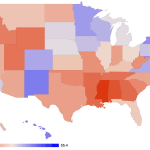Tools for mis/disinfo research
- Iffy Index of Unreliable Sources lists sites that regularly fail fact-checks.
- Fact-check Search returns search results from dozens of fact-checking sites.
- Pink Slime: Fake-local News maintains a map, table, and timeline.
- Wayback Workshop gets URLs from the web-archive (for linking to unreliable sites).
- Our Fact-check Feed sister site is a searchable database of 54K fact-checks, 2016–now.
Iffy.news resources were used in 60+ research papers and 20+ mis/disinfo tools and health/media guides.
Latest reliability reports
PolitiFact-check scores
PolitiFact 2024: Voters Prefer Facts
Voters tend to send the more truthful candidate to the US Senate. On average, winners perform better on PolitiFact checks than losers, incumbents better than challengers. But that may be changing.

PolitiFact 2024: Scores
Every four years Iffy.news compiles PolitiFact-checks to rate the veracity of political people. We convert their fact-checks into credibility scores, comparing pols, pundits, PACs, and parties.

PolitiFact 2020: Voters Face Facts
Using PolitiFact-checks, we can compare the credibility of candidates and determine, from past elections, if voters tend to pick the more truthful candidate.

PolitiFact 2020: All the Presidents’ Peeps
Part two of the series that turns PolitiFact-checks into credibility scores, calculates the truth ratings of people in the past three presidential administrations.

PolitiFact 2020: Pols, Pundits, and Pant Fires
This last of a three-parter compares the PolitiFact credibility of groups making political claims. The most truthful: comedians. The least: social media.dential administrations.

Consider the Source
Anatomy of an anti-vax fact-check: Consider the Source, Check the Site, Confirm the Content. Who made the claim, who published it, where’s the evidence?

MSM and fake news
Mainstream media spreads fake news
Mainstream media contributes significantly to the infectious spread of conspiracy fantasies. But it could also hold the cure.

(Assume) Everything on Social Media Is Wrong
Social media’s malgorithms spread lies and hate. The platforms are unwilling and probably unable to change.

The United States of Conspiracy
Americans will believe almost anything. Two decades of polling prove that. No matter how insane the claim, at least 10% and up to 40% of people will say it’s true.

Mainstream media funds fake news
When debunkers link to fake-news stories, they do more harm than good. There’s a right way and wrong way to cite unreliable sources. Most publishers use the latter.

Pandemic and party
Vax vs. Vote
A side-by-side, state-by-state comparison showing vaccination rates closely correlated with Biden-vote percentages.

Congress’ COVID-Positive Party
When debunkers link to fake-news stories, they do more harm than good. There’s a right way and wrong way to cite unreliable sources. Most publishers use the latter.

Your State’s Been Pink-Slimed
Tracking cross-country plink-slime sites that masquerade as local news, with an interactive USA map and a Slime by State table.

Bias vs. B.S.
Bias doesn’t get a publisher into Iffy.news, only bullshit does. Iffy is blind to bias. However, when bias becomes B.S., data can help determine which direction bias most often turns.

Adtech is bad tech
Who Funds Fake News?
Fake news is a for-profit business, funded mostly by advertising, with revenue flowing from the biggest brands and adtech agencies into the coffers of clickbait, hate, and mis/disinfo sites.

Brands Behaving Badly
Millions in ad dollars are helping spread COVID conspiracies, mostly without the advertiser’s knowledge.

Iffy Index of Unreliable Sources
Misinformation thrives online, propped up by advertising dollars, political donations, and social media shares.
In scores of studies, researchers have tried to figure out how falsehoods spread. Their research often relies on lists of fake-news sources. However, those lists are out-of-date and full of 404s.
Better data means better results, for researchers, reporters, and readers. So I’ve built a better dataset:
The Iffy Index of Unreliable Sources is a resource for researchers needing a database of untrustworthy online sources, based on factual-reporting ratings by Media Bias/Fact Check, the professional news/info website reviewer.
Most-visited unreliable sources
The full Iffy Index has data on 1,300+ sites that regularly publish unreliable information, including clickbait, fake news, and unproven allegations. The table below lists the Iffy sites with the most web traffic (by Alexa Global Rank).
The Iffy.news Index has details on each domain and the methodology used to interpret the data. To assess the credibility of a particular site or story, try the Fact-check Search tool.

